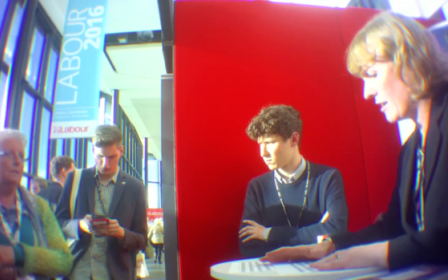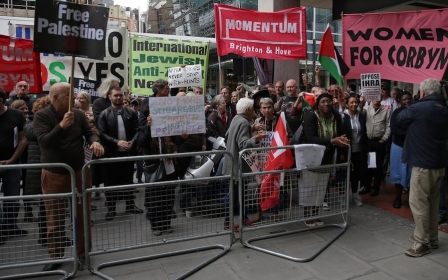Labour to debate Palestine and arms embargo on Israel at conference

LIVERPOOL, UK - Labour delegates have voted for a debate on Palestine at the party’s annual conference, the first for many years, which will include a motion for a UK arms embargo against Israel.
A debate on Palestine was backed on Sunday by 188,000 votes from local party members, putting it in the top four issues to be discussed by the party’s conference in Liverpool.
Constituency parties put Palestine ahead of Brexit and the NHS in their choice of issues to be discussed by conference in Liverpool.
Today for the first time in many years a Palestine motion is on the agenda of conference
- Ben Jamal, Palestine Solidarity Campaign
“Ordinary members of the party want Labour to stand up for Palestinian rights. And today for the first time in many years a Palestine motion is on the agenda of conference," said Palestine Solidarity Campaign director Ben Jamal, who was speaking outside of the conference.
The vote means Palestine will be debated on the floor of conference on Tuesday, including a motion that says UK arms sales to Israel should be suspended until it carries out an independent investigation into the killing of more than 170 protesters in Gaza since 30 March, Jamal told Middle East Eye.
Conference votes are not binding on the leadership, however Labour leader Jeremy Corbyn is a long-time supporter of the Palestinian cause, and has committed the party to recognising the state of Palestine if Labour comes to power.
Labour’s General Secretary Jennie Formby was cheered on Sunday when she said that, in the context of the anti-Semitism debate that has surrounded the party all summer: “We must not allow the voices of Palestinians to be silenced and members must be able to speak out about the terrible injustices they face.”
She added, however, that freedom of expression does not mean the freedom to be anti-Semitic.
A new Labour and Palestine parliamentary group is also being launched at the conference, with support from MPs.
Palestinian members of the Israeli Knesset wrote an open letter in support of Corbyn earlier this month, rejecting allegations of anti-Semitism made by several Labour MPs and the UK's former chief rabbi Jonathan Sacks.
Ben Jamal told a 250-strong meeting that the anti-Semitism allegations against Labour were part of an attempt to shut down freedom of expression on Palestine, but the opposite had happened, with Palestine now back on the political agenda with support from the Labour leadership.
“If you pass racist laws, if you operate in a racist way, there is nothing racist in calling you a racist state. If Israel wants to stop that accusation, it needs to end the occupation and stop operating in a racist way,” said Jamal.
Shadow minister for peace Fabian Hamilton told the Palestine Solidarity meeting that Labour would recognise a state of Palestine as one of its first acts on coming to power.
However, two Palestinian speakers at the event were critical of the party’s policy on supporting the Oslo agreement, which foresees a Palestinian state created side-by-side with Israel.
The Israeli government of Benjamin Netanyahu has said there will be no Palestinian state and has effectively killed off the 1993 Oslo peace accords with the backing of US President Donald Trump, who unilaterally moved the US embassy to Jerusalem in December, in defiance of a majority of UN members.
“With respect to the words of Fabian Hamilton, Labour can’t go on supporting an idea that is defunct,” said UK-based Palestinian author and academic Ghada Karmi during the meeting.
“Palestinians are under the greatest assault that I can remember. They are under assault from every side and at every level,” she said, beginning with the presidency of Donald Trump.
She called on the party to stop being apologetic and defensive with regard to Israel’s “atrocities”. “We now have a golden opportunity to call Israel to account, to take the gloves off, to confront Israel’s crimes, to end the complicity that has kept Israel’s impunity in place.”
Hazem Jamjoum, a Palestinian-American academic from the Al-Shabaka think tank, said that the British empire had helped create the state of Israel and for this reason the UK had a special responsibility to support the Palestinians.
He warned that Israel’s “ethno-nationalist” policies, including the recent nation-state law, were creating a dangerous precedent for nationalist parties in the West. He quoted US white nationalist Richard Spencer saying recently that Israel was a model of the kind of ethno-state he would like to see in America.
“Because Israel is able to get away with apartheid laws, racist laws, laws that enshrine privilege based on a particular identity category, movements around the world that are aiming to create racist legislation, to create racist privileges within society, are now able to use Israel as an example, and to say, ‘if they get to do it, why can’t we?’”
Middle East Eye propose une couverture et une analyse indépendantes et incomparables du Moyen-Orient, de l’Afrique du Nord et d’autres régions du monde. Pour en savoir plus sur la reprise de ce contenu et les frais qui s’appliquent, veuillez remplir ce formulaire [en anglais]. Pour en savoir plus sur MEE, cliquez ici [en anglais].




